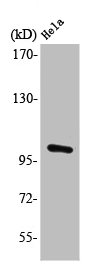![WB analysis of NIH-3T3 cell lysate using GTX13900 PMS2 antibody [163C1251]. Dilution : 2 μg/ml WB analysis of NIH-3T3 cell lysate using GTX13900 PMS2 antibody [163C1251]. Dilution : 2 μg/ml](https://www.genetex.com/upload/website/prouct_img/normal/GTX13900/GTX13900_1062_WB_w_23060620_935.webp)
WB analysis of NIH-3T3 cell lysate using GTX13900 PMS2 antibody [163C1251]. Dilution : 2 μg/ml
PMS2 antibody [163C1251]
GTX13900
ApplicationsFlow Cytometry, Mass Spectrometry, Western Blot, ImmunoHistoChemistry, ImmunoHistoChemistry Paraffin
Product group Antibodies
ReactivityHuman, Mouse
TargetPMS2
Overview
- SupplierGeneTex
- Product NamePMS2 antibody [163C1251]
- Delivery Days Customer9
- Application Supplier NoteWB: 1 - 2 microg/ml. IHC-P: 2 - 5microg/ml. FACS: 1microg / 106 cells. *Optimal dilutions/concentrations should be determined by the researcher.Not tested in other applications.
- ApplicationsFlow Cytometry, Mass Spectrometry, Western Blot, ImmunoHistoChemistry, ImmunoHistoChemistry Paraffin
- CertificationResearch Use Only
- ClonalityMonoclonal
- Clone ID163C1251
- Concentration1 mg/ml
- ConjugateUnconjugated
- Gene ID5395
- Target namePMS2
- Target descriptionPMS1 homolog 2, mismatch repair system component
- Target synonymsHNPCC4, LYNCH4, MLH4, MMRCS4, PMS-2, PMS2CL, PMSL2, mismatch repair endonuclease PMS2, DNA mismatch repair protein PMS2, PMS1 homolog 2, mismatch repair protein, PMS1 protein homolog 2, PMS2 postmeiotic segregation increased 2
- HostMouse
- IsotypeIgG1
- Protein IDP54278
- Protein NameMismatch repair endonuclease PMS2
- Scientific DescriptionThis gene is one of the PMS2 gene family members found in clusters on chromosome 7. The product of this gene is involved in DNA mismatch repair. It forms a heterodimer with MLH1 and this complex interacts with other complexes bound to mismatched bases. Mutations in this gene are associated with hereditary nonpolyposis colorectal cancer, Turcot syndrome, and are a cause of supratentorial primitive neuroectodermal tumors. Alternatively spliced transcript variants have been observed for this gene. [provided by RefSeq]
- ReactivityHuman, Mouse
- Storage Instruction-20°C or -80°C,2°C to 8°C
- UNSPSC12352203

![IHC-P analysis of human colon carcinoma tissue using GTX13900 PMS2 antibody [163C1251]. Dilution : 5 μg/ml Antigen retrieval : Heat induced antigen retrieval (HIER) using 10mM sodium citrate buffer (pH 6.0) IHC-P analysis of human colon carcinoma tissue using GTX13900 PMS2 antibody [163C1251]. Dilution : 5 μg/ml Antigen retrieval : Heat induced antigen retrieval (HIER) using 10mM sodium citrate buffer (pH 6.0)](https://www.genetex.com/upload/website/prouct_img/normal/GTX13900/GTX13900_438_IHC-P_w_23060620_709.webp)



![IHC-P analysis of human colon adenocacinoma tissue section using GTX03301 PMS2 antibody [A16-4].](https://www.genetex.com/upload/website/prouct_img/normal/GTX03301/GTX03301_IHC-P_1_w_23053123_636.webp)
